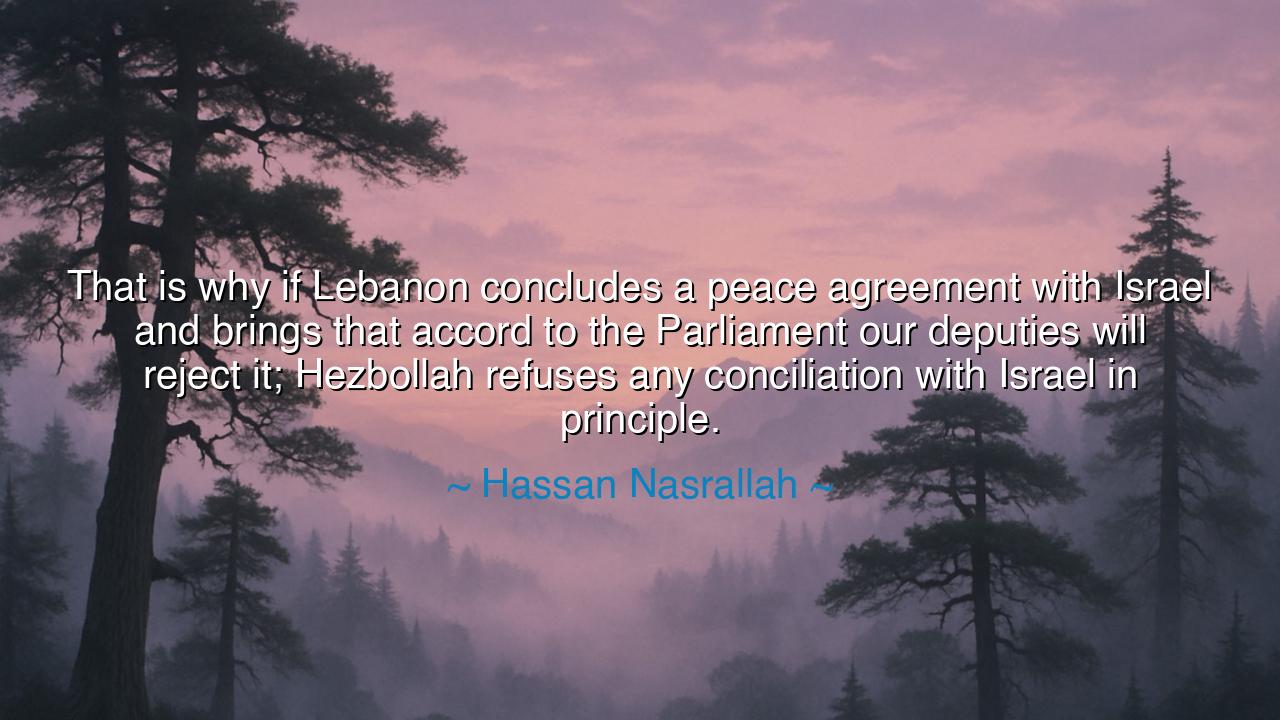
That is why if Lebanon concludes a peace agreement with Israel
That is why if Lebanon concludes a peace agreement with Israel and brings that accord to the Parliament our deputies will reject it; Hezbollah refuses any conciliation with Israel in principle.






“That is why if Lebanon concludes a peace agreement with Israel and brings that accord to the Parliament our deputies will reject it; Hezbollah refuses any conciliation with Israel in principle.” Thus spoke Hassan Nasrallah, leader of Hezbollah, and in these words we hear not merely the position of a faction, but the echo of an ancient truth: that in lands torn by conflict, peace itself is not always seen as a gift, but at times as a surrender. Here is the paradox of nations: what one calls peace, another may call betrayal; what one calls conciliation, another may call chains. Nasrallah’s declaration is a mirror of the deep wounds of Lebanon, of Israel, and of their long and bitter history.
For the heart of the quote lies in the refusal of conciliation in principle. It is not merely a rejection of a document, nor of signatures upon parchment, but of the very idea that reconciliation can occur between enemies bound by decades of war, loss, and blood. Such rejection springs not from whim, but from conviction: that to accept peace with Israel would mean accepting what Hezbollah believes to be injustice, occupation, and dishonor. Thus, Nasrallah speaks not only as a politician, but as a guardian of memory, saying to his people: “We will not forget. We will not forgive. We will not bow.”
The ancients, too, knew such refusals. Recall the tale of Carthage and Rome. Again and again, Rome sought to bind Carthage with treaties of submission, yet Hannibal’s city rejected peace that smelled of humiliation. They chose defiance, though it ended in their destruction. History has shown that sometimes nations will endure suffering rather than accept what they believe to be a false peace. To them, it is better to fight and perish with honor than to sign accords that deny their deepest convictions.
Yet let us not forget the opposite lesson. There was a time when Egypt and Israel, long enemies, signed the Camp David Accords. For Egypt’s Anwar Sadat, it was an act of daring, a gamble upon the future rather than the past. He believed that true leadership required breaking the chain of endless wars. Though many in his own land reviled him and his life was cut down in violence, the peace he signed endured beyond his death. Here we see the other side of history: that though rejection of conciliation may preserve honor, acceptance of it may preserve life.
The meaning of Nasrallah’s words is not that peace is impossible, but that peace without trust, peace without justice, peace without healing of wounds, is no peace at all. To force reconciliation where hearts still burn is to plant seeds in scorched earth. His refusal is a reminder that agreements on paper cannot mend broken spirits. For true peace is not only the silence of guns, but also the mending of hearts. Without this, treaties are as fragile as parchment in the wind.
The lesson for us is profound: in our own lives, as in the lives of nations, there are moments when reconciliation feels like defeat, when conciliation seems like dishonor. We must ask ourselves—are we seeking peace, or merely silence? Are we offering reconciliation that is just, or are we demanding surrender in disguise? If peace is built upon injustice, it will not endure; if it is built upon fairness, it may yet outlive those who signed it.
Therefore, children of tomorrow, take heed: peace cannot be commanded; it must be cultivated. Do not mistake treaties for trust, nor silence for healing. Whether between nations or between friends, seek not the shallow accord that denies the truth, but the deeper conciliation that honors justice. Only then will peace be more than a pause in war—it will be a foundation for generations. And know this: to refuse false peace may be wisdom, but to embrace true peace when it finally appears—that is the greater courage.






NTNguyen Thao
Nasrallah’s position seems to reflect the long-standing tensions in the Middle East, but it also raises questions about the nature of peace. If one of the parties involved, like Hezbollah, refuses any form of conciliation, how can real peace emerge? Is peace solely about political agreements, or does it require a broader shift in attitudes and ideologies? What role do external pressures and international relations play in such a complex situation?
DDDang Dung
The statement made by Nasrallah about Hezbollah’s rejection of any peace agreement with Israel makes me think about the broader context of regional conflict. How can a nation move towards peace when such strong opposition comes from powerful factions within? Is peace between Israel and Lebanon even possible when one of Lebanon’s most influential groups rejects the idea of conciliation in principle? How does this impact the future of Lebanon and its relationships with neighboring countries?
NCNguyen Cuong
Nasrallah’s words highlight a deep divide in Lebanon’s political landscape, with Hezbollah rejecting any agreement with Israel outright. But can peace ever truly be one-sided? What happens when one side, like Hezbollah, refuses to even entertain negotiations, while others might be willing to compromise? Does this make a long-term resolution unrealistic, or does it speak to a larger ideological struggle that goes beyond just political agreements?
TLLe thi Loan
Hassan Nasrallah’s statement about Hezbollah’s firm stance against any conciliation with Israel is quite revealing. It’s clear that there are deep-rooted historical and ideological reasons for this position, but I wonder—can true peace be achieved if one of the key players refuses any form of dialogue? Is it possible for Lebanon to move forward with peace while facing such resistance from powerful factions within the country? What are the implications for regional stability?